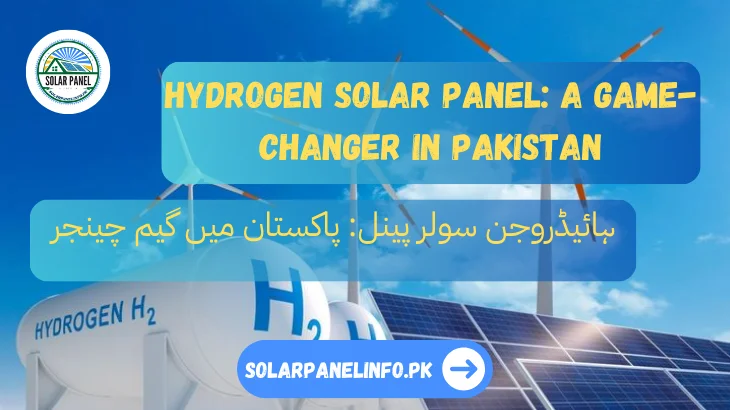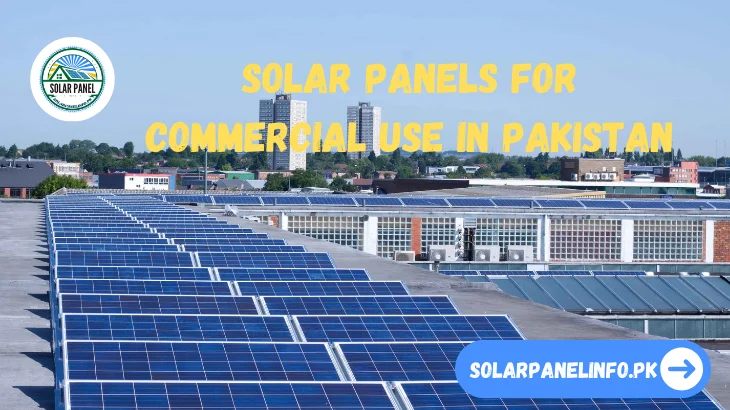Hydrogen Solar Panel: A Game-Changer in Pakistan
As a renewable energy source, solar energy has grown in importance. A new technology called hydrogen solar panels provides a more sustainable and clean way to generate electricity. They are regarded as a good investment and work well all year round, particularly in the winter when sunlight is scarce, despite price variations. Here we will discuss the Hydrogen Solar Panel.
Read more: Bifacial solar panels in Pakistan

قابل تجدید توانائی کے ذریعہ، شمسی توانائی کی اہمیت میں اضافہ ہوا ہے۔ ہائیڈروجن سولر پینلز نامی ایک نئی ٹیکنالوجی بجلی پیدا کرنے کا ایک زیادہ پائیدار اور صاف طریقہ فراہم کرتی ہے۔ انہیں ایک اچھی سرمایہ کاری کے طور پر شمار کیا جاتا ہے اور سارا سال اچھی طرح کام کرتے ہیں، خاص طور پر سردیوں میں جب قیمتوں میں فرق کے باوجود سورج کی روشنی کم ہوتی ہے۔ یہاں ہم ہائیڈروجن سولر پینل پر بات کریں گے۔
What Are Hydrogen Solar Panels?
The hydrogen solar system is a technology that merges the benefits of solar energy and hydrogen fuel cells. Solar panels are designed to convert sunlight into electrical energy, while hydrogen fuel cells generate power by combining hydrogen and oxygen. Hydrogen solar panels integrate with solar power systems to enhance energy storage capabilities. This significant advantage allows users to store energy during non-sunny periods, such as at night or during cloudy weather, setting them apart from traditional solar panels.
Read more: 6kW Solar Systems Price in Pakistan
Pakistan’s Energy Crisis: A Quick Overview
Pakistan’s energy sector relies significantly on imported oil and natural gas, leading to economic strain and high import costs, which account for over 25% of the import bill. The country faces frequent power outages, high electricity prices, and an unreliable grid, impacting daily life and industrial productivity. However, with abundant sunlight and an average solar insolation of 5.3 kWh/m²/day, solar energy presents a viable solution, especially with the potential of hydrogen solar panels for generating both electricity and fuel.
Advantages of Hydrogen Solar Panels
They have many advantages of hydrogen solar panels.
Reliable Energy Storage قابل اعتماد توانائی کا ذخیرہ
One of the primary challenges associated with solar energy is the ability to store excess power for use during times when solar generation is not possible. Hydrogen solar technology addresses this issue by converting and storing energy in the form of hydrogen gas, allowing for energy availability even in the absence of sunlight.
Environmental Benefits ماحولیاتی فوائد
Hydrogen fuel cells produce only water vapor as a byproduct, representing one of the cleanest energy processes available. By integrating hydrogen production with solar energy, Pakistan has the opportunity to significantly diminish its dependency on fossil fuels, resulting in lower greenhouse gas emissions.
Reduced Energy Costs توانائی کے اخراجات میں کمی
While the initial investment for a hydrogen solar system can be high, it is a long-term solution that can operate efficiently for many years without significant maintenance. This technology not only offers the potential for a consistent energy supply but can also provide economic benefits by shielding users from fluctuating electricity costs and taxes associated with traditional energy bills.
How Hydrogen Solar Panels Can Transform Pakistan
Energy Independence توانائی کی آزادی
Producing hydrogen domestically through solar energy and water can significantly reduce Pakistan’s reliance on imported fossil fuels. This transition could enhance the country’s balance of payments and alleviate the economic pressure on the government.
Clean and Sustainable Energy صاف اور پائیدار توانائی
As one of the country’s most vulnerable to climate change, Pakistan stands to benefit from a shift to green hydrogen. This transition has the potential to lower carbon emissions and help meet the country’s climate commitments outlined in the Paris Agreement.
Rural Electrification دیہی بجلی
Standalone hydrogen solar systems can greatly benefit remote and off-grid areas in Pakistan. These systems could provide essential electricity and clean cooking fuel, thereby improving living standards in rural communities without the need for costly grid expansion.
Job Creation and Technological Advancement ملازمت کی تخلیق اور تکنیکی ترقی
The development and implementation of hydrogen solar panel technology could stimulate local industries, create jobs in manufacturing, maintenance, and research, and encourage collaborations with international clean technology firms.
Energy Storage Solution توانائی ذخیرہ کرنے کا حل
Hydrogen presents an effective solution for energy storage, as it can be stored for extended periods. This capability addresses one of the main challenges of renewable energy—intermittency—and allows for the storage of excess solar power generated during the day for use at night or during cloudy conditions.
Challenges of the hydrogen solar panel in Pakistan
High Cost زیادہ لاگت
The high cost of solar technology presents a significant challenge in Pakistan. Although the prices of solar panels have been declining in recent years, the reliance on advanced technology continues to maintain their overall expense.
Lack of Infrastructure انفراسٹرکچر کا فقدان
Pakistan currently faces limitations in its hydrogen infrastructure, as refueling stations and storage facilities are not well-developed. This lack of infrastructure restricts the broader adoption of hydrogen-based technologies for energy generation and transportation.
Technology Development ٹیکنالوجی کی ترقی
The production and efficiency of storage and fuel cell technologies in the hydrogen sector are still in a state of evolution. As technological advancements are made, it is expected that prices will decrease over time. However, it may take a while before hydrogen solar panels become affordable and widely accessible in cities across Pakistan.
Read more: Solar Panels
Recommendations for a Hydrogen Future
Government Incentives حکومتی مراعات
To foster investment in hydrogen solar technology, the government needs to implement various financial incentives, including subsidies, tax breaks, and grants. These measures can significantly reduce the initial costs and encourage stakeholders to explore this promising energy sector.
Public-Private Partnerships پبلک پرائیویٹ پارٹنرشپس
Collaboration among universities, research institutions, and private sector companies is crucial in accelerating innovation within hydrogen solar technology. Such partnerships can leverage diverse expertise to drive research and development efforts.
Pilot Projects پائلٹ پروجیکٹس
Implementing pilot projects in regions with abundant sunlight, such as Balochistan and Sindh, can provide valuable insights into the feasibility of hydrogen solar technologies. These demonstration projects will not only showcase the potential of the technology but also attract potential investors by proving its viability.
International Cooperation بین الاقوامی تعاون
Engaging in partnerships with countries that are leaders in hydrogen technology, such as Germany, Japan, and China, can facilitate access to advanced expertise and funding. Collaborating with these nations can help accelerate the adoption and development of hydrogen solar initiatives.
Regulatory Framework ریگولیٹری فریم ورک
Establishing a comprehensive regulatory framework, including a clear hydrogen policy, safety standards, and infrastructure planning, is vital for creating an attractive environment for long-term investment. Such measures will provide clarity and assurance to investors regarding the government’s commitment to supporting hydrogen solar technology initiatives.
Conclusion
For Pakistan’s energy sector, hydrogen solar panels are a revolutionary development that combines solar energy and hydrogen fuel technology to provide dependable energy storage and lessen dependency on fossil fuels. Implementation can be facilitated by focused investments, encouraging policies, and international cooperation, even in the face of obstacles like exorbitant costs and poor infrastructure. Pakistan is ideally situated to implement this technology, fostering sustainable development and economic stability, thanks to its plentiful solar resources.
پاکستان کے توانائی کے شعبے کے لیے، ہائیڈروجن سولر پینل ایک انقلابی پیشرفت ہیں جو شمسی توانائی اور ہائیڈروجن ایندھن کی ٹیکنالوجی کو یکجا کر کے قابل اعتماد توانائی کا ذخیرہ فراہم کرتے ہیں اور فوسل فیول پر انحصار کم کرتے ہیں۔ توجہ مرکوز سرمایہ کاری، حوصلہ افزا پالیسیوں اور بین الاقوامی تعاون کے ذریعے عمل درآمد کو آسان بنایا جا سکتا ہے، حتیٰ کہ بے تحاشا اخراجات اور ناقص انفراسٹرکچر جیسی رکاوٹوں کے باوجود۔ پاکستان مثالی طور پر اس ٹیکنالوجی کو لاگو کرنے کے لیے واقع ہے، پائیدار ترقی اور معاشی استحکام کو فروغ دینے کے لیے، اپنے وافر شمسی وسائل کی بدولت۔
FAQ’s
What makes hydrogen solar panels different from traditional solar panels?
>>>>>>Hydrogen solar panels store energy as hydrogen gas, allowing power availability even in the absence of sunlight, unlike traditional panels that depend on immediate sunlight or battery storage.
Are hydrogen solar panels suitable for rural areas in Pakistan?
They are perfect for rural and off-grid areas, providing both electricity and clean fuel without needing extensive infrastructure.
Is hydrogen solar technology affordable for the average consumer in Pakistan?
>>>>>>It is currently expensive due to its advanced nature, but costs are expected to decrease over time as technology improves and government incentives are put in place.


